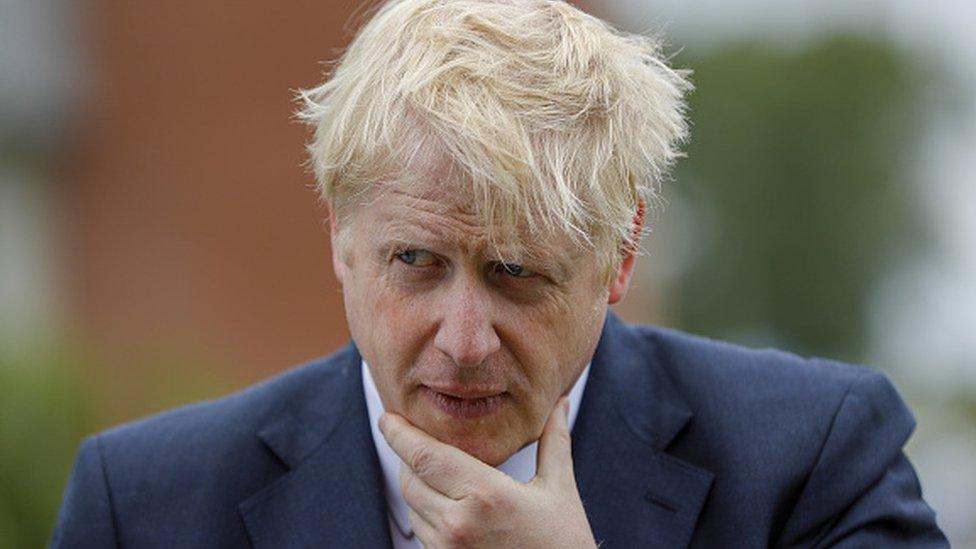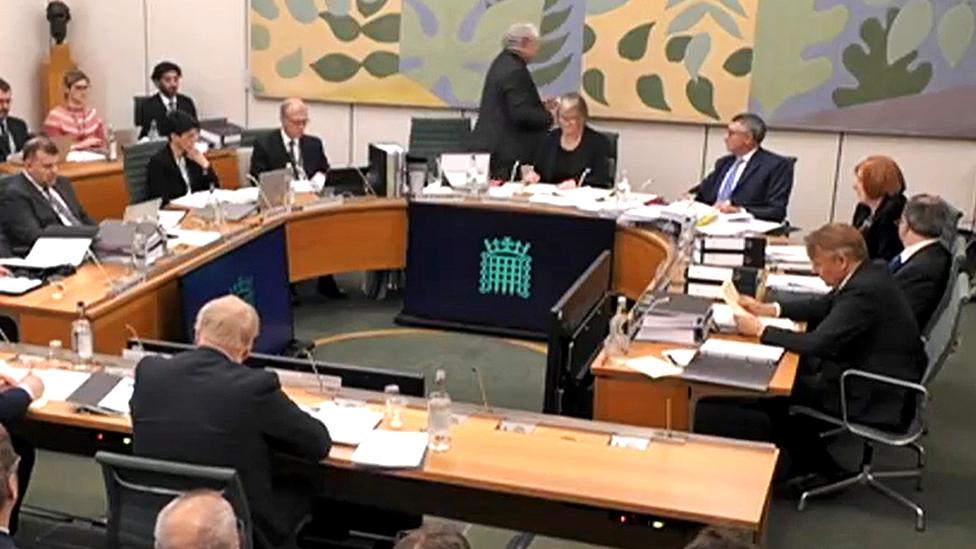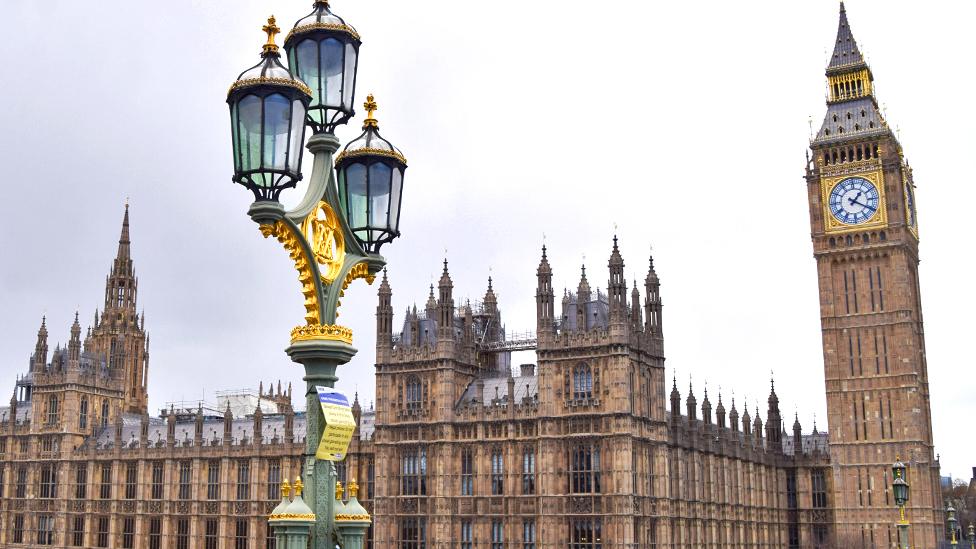Boris Johnson deliberately misled Parliament over Partygate, MPs find
- Published
- comments

The privileges committee finds Boris Johnson committed repeated contempts of Parliament
Boris Johnson would have faced a 90-day suspension if he were still an MP, after an inquiry found he had deliberately misled Parliament over lockdown parties.
In a damning report, the Privileges Committee said the former PM had committed repeated offences with his Partygate denials.
The suspension would have potentially triggered a by-election to replace him, had Mr Johnson not already stood down last week after seeing the findings.
He called their conclusions "deranged".
In a blistering statement, he branded the committee a "kangaroo court" and claimed its year-long inquiry had delivered "what is intended to be the final knife-thrust in a protracted political assassination".
Mr Johnson - who helped the Conservative Party win a landslide election victory under his leadership only three years ago - is the first former prime minister to have been found to have deliberately misled Parliament.
It has been confirmed a by-election to replace him in his Uxbridge and South Ruislip constituency will take place on 20 July.
On the same day, voters will also elect a replacement for Johnson ally Nigel Adams, who also stood down as MP for Selby and Ainsty in the wake of the former PM's resignation.
The seven-person committee, chaired by Labour's Harriet Harman but with a Tory majority, has been considering whether Mr Johnson misled MPs about Covid breaches in Downing Street during the pandemic.
When giving evidence to the committee in March, Mr Johnson staunchly denied misleading Parliament on purpose, in a stormy session.
But in its lengthy report, external, which runs to 106 pages, the committee concluded that Mr Johnson's "personal knowledge of breaches", combined with "his repeated failures pro-actively to investigate" them, amounted to "a deliberate closing of his mind" to the facts.
The committee focused on six gatherings between May 2020 and January 2021, and statements Mr Johnson made to Parliament about them.
The committee concluded that officials did not advise Mr Johnson that social-distancing guidelines had been followed at all times, despite him making the claim in the House of Commons.
In key evidence, one of Mr Johnson's most senior officials, Martin Reynolds, said he advised the former prime minister against making the claim, questioning whether it was "realistic".
Some of Mr Johnson's denials, the committee added, were "so disingenuous that they were by their very nature deliberate attempts to mislead".
They amounted to a "contempt" of Parliament, the MPs added, because they stopped Parliament carrying out its "essential task" of holding him to account.
Explaining their recommendation for a 90-day suspension, they found that he had also committed a repeated contempts by:
Deliberately misleading MPs on the Privileges Committee while they were investigating him
Referring to the committee's findings before they were published, in his resignation statement last week
"Impugning the committee" in his criticism of it, and being complicit in a "campaign of abuse" against its members
The committee has also recommended that Mr Johnson should be stripped of the pass given to former MPs allowing them access to Parliament.
Two of the committee's MPs, the SNP's Allan Dorans and Labour's Yvonne Fovargue, wanted to go further and expel him from the Commons - but were outvoted by the committee's four Tory MPs.
Free vote
The report will be debated by MPs, with a vote held on whether to approve the findings on Monday.
MPs are expected to approve the report, after Commons leader Penny Mordaunt said Tory MPs would not be ordered to vote against it.
So far, only a handful of Conservative MPs have openly criticised the report, including Johnson loyalist and former culture secretary, Nadine Dorries.
In a tweet, Ms Dorries claimed the report had "overreached" and said any Tory MP who voted to approve it was "fundamentally not a Conservative".
Other Tory MPs supportive of Mr Johnson hit out at the findings, with Jacob Rees Mogg saying the committee looked "foolish" and Simon Clarke adding the report was "absolutely extraordinary to the point of sheer vindictiveness".
But Labour's deputy leader, Angela Rayner, said the committee had "gone off the evidence" to reach "a very damning conclusion".
She said Mr Johnson was a "disgraced prime minister" who "shouldn't be anywhere near Parliament".
The Liberal Democrats have called for Mr Johnson to be stripped of the £115,000 annual allowance available to former prime ministers to run their office.
"This damning report should be the final nail in the coffin for Boris Johnson's political career," the party's deputy leader, Daisy Cooper, said.
A campaign group representing families bereaved by Covid said he should "never be allowed to stand for any form of public office again".
Scathing statement
The committee's report was met with disdain by Mr Johnson, who repeated his defence at length in a bitter parting shot.
He said he had been warned the committee was driven by "the sole political objective of finding me guilty and expelling me from Parliament".
He echoed many of the assertions he made in front of the committee in March, including his claim that he believed all of the events he attended were "lawful" and "required by my job".
On the charge he deliberately misled Parliament, Mr Johnson said this was "rubbish" and based on "a series of things that are patently absurd".
Watch: Key moments from Boris Johnson's Partygate grilling
He compared the committee to late TV astrologer Mystic Meg for concluding he was "unlikely to have been unaware" of a gathering attended by dozens of staff in No 10 Downing Street's press office in December 2020.
"How do they know what I saw?" Mr Johnson said. "What retinal impressions have they somehow discovered, that are completely unavailable to me?"
The lockdown parties at the heart of the committee's report first came to public attention in newspaper reports at the end of 2021.
The reports exploded into a long-running scandal that dogged Mr Johnson's premiership and stoked discontent among his ministers, who forced him to resign as prime minister last year.
An internal inquiry into the parties was led by senior civil servant Sue Gray, and a Metropolitan Police investigation resulted in multiples fines for breaches of Covid rules.
Mr Johnson was fined by police for breaking Covid rules in 2020 - making him the UK's first sitting prime minister to be sanctioned in such a way.
Related topics
- Published15 June 2023

- Published15 June 2023

- Published15 June 2023